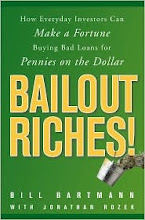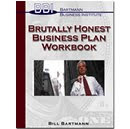Bill Bartmann, business coach, says a good sales letter is essential for any business that relies primarily on sales. You are relying on being able to bring people to your way of thinking so they will be willing to use your product, service or in some other way hire you. This means you need a sales letter to send out to your prospective clients.
But do you know what to really have in a sales letter? A sales letter has to be as good of a representation of you as you are; therefore, you need to be sure it's written correctly to make someone read it and give you a chance, instead of just tossing it aside.
Grab and Hold the Reader’s Attention
Bill Bartmann's tip #1 to sales letters is that you want make sure that you can grab the attention of those who are reading it. Start by giving them a good reason to read on. For example, if your sales letter is to promote financial advising services, you may want to open with a simple phrase that lets the reader know why they need your service, such as 'One in three people are losing money on their retirement investments and won't have the money to support themselves in their golden years. But we can help…"
This type of thing helps people realize immediately that they may be one of the people your product can help.
Focus on the Main Points
Bill Bartmann's tip #2 to sales letters is to stick to the points. Make all the important sales points you need to without rambling. Consider using bullet points to talk about features of a product. For example, if you are selling specialty pillows, you may want to make a list of reasons people would like to purchase them such as:
Why are our pillows better than the others on the market?
They're:
Hypo Allergenic
More Supportive
Organic
Created especially for those with neck ailments
Etc….
Let them know why this is what they want and need, hitting all of your sales points in rapid succession.
Bill Bartmann Keeps it Simple
While you may be proud of your business and want to be able to explain all the intricate workings of it to your customers so they can be just as proud, they really don't need to read all of that and they won't. Remember the KISS method (Keep It Simple Stupid). While you may be excited about your business and all its details, that may not be as exciting to them, and you don't want to lose them by bogging them down in information they don't need.
Read and Re-read
Before you send a sales letter out, be sure to read and reread it to assure it says what you want it to. More sales letters go out with typos and mistakes that could have been averted if you had just read it over a few times before sending it.
Bill Bartmann is a nationally acclaimed business coach and founder of the Billionaire Business System, a series of books and seminars that teach you what you need to know running a business. Bill Bartmann has provided real business guidance to thousands of entrepreneurs to help them succeed in business, even during tough economic times.
Sunday, April 26, 2009
Sunday, April 19, 2009
Bill Bartmann Business Tips: How to Build a Strong Advisory Board
Every business should have an advisory board. A strong advisory board brings experience and advice to your company without the cost of high business consulting fees. You need a group of people who know about things you don’t; people who possess the skills and attributes that your business requires to be successful.
So, how do you find these knowledgeable people? Remember, it’s not just about who you know, but who your friends know. Widen the circle; don’t just think of the 100 people you know, but the 100 people each of them knows as well. Let’s say you are not great with numbers and you don’t personally know a CPA; chances are likely one of your friends knows one.
The first thing you should do is make up about a dozen 3-ring binders that you will hand out to your advisory board. The binder will contain three sections:
Executive Summary: Provide a short description of your company; just the information that will be important to your Board of Advisors.
Statement of Purpose: The value of or the purpose your Board of Advisors will serve as they make a difference in your business; tell them why they will be valuable to you.
Sample Agenda: Show an example of an agenda for a 1-hour meeting
Members’ Bios: Of course, this section cannot be filled until the group is formed. Provide a short bio of each existing member and their contact information, so when you’re soliciting new members, they get to see who else is on this team.
Make a list of the special skills that you would need the members of your advisory board to possess, and then look for those people. Make an appointment to see “Mr. CPA.” Call his office; leave a message with the receptionist that you would like a 5 minute appointment with Mr. CPA. Be sure to stress that you promise to only take 5 minutes of his time.
When you go in to see “Mr. CPA, introduce yourself and hand him a binder, explaining, briefly what it contains. Then, say something like, “I want to surround myself with people like you, so I can take my business to a whole new level.” If you already have some members who are well known in the community, show him the section with the bios, “Perhaps you know so and so, who is also a business owner in our area.”
Then show the sample agenda, “Go ahead and contact some of the other members on the board. We meet monthly and meetings do not go over one hour. I don’t expect you to say yes now, so I will leave you this book and look forward to hearing from you. I promised to only take 5 minutes of your time, so I’ll leave you to think this over.”
Of course, you can stay and talk if he encourages it, but at this point you have accomplished something huge in just 5 minutes. You made a great impression by complimenting him, showing your respect, and keeping your promise to only take up 5 minutes of his time. This is a great display of your integrity.
The Monthly Meetings
A lot will be accomplished in these monthly meetings of only 1 hour each, so they should be held somewhere where everyone can easily make it on time and where everyone will be able to focus on the agenda and the objective. The meeting should not be in a noisy fast food place, in your warehouse, or in the office where phones are ringing.
Rent a small conference room at a hotel where there will be plenty of space, a conference table and comfortable, professional environment. Meetings will likely take place after work, from 6pm to 7pm, when many people are home eating dinner, so be sure to provide something light to show you care and that you appreciate them postponing their dinner to meet with you.
Provide additional pens, note pads and any other supplies you might need to help things go more smoothly. A flip chart with markers might be useful.
As you promised at the 5 minute meeting with Mr. CPA, be sure to hand out the agenda and start on time, so everyone can be home when they promised their family they would be. Keep to the agenda as much as possible and make sure the meeting does not go over one hour.
If you should end up in a debate or a lengthy conversation that causes you to spend too much time on a topic, then you will have to wrap things up, when the hour is up, and postpone the remaining items on the agenda for the next meeting. Do not ask if it is OK to run a little late; everyone will likely say “yes” but they will not be happy and they may not be as willing to continue being on your board of advisors if this becomes a habit.
When planning your next agenda, be sure to start with “old business” where you relate back to your advisors who provided ideas during the last meeting. Tell them that you have been thinking about their idea and when you plan to implement it. Or, if you’re not sure if you’re ready for this action at this time; let them know. They will be happy that you are showing them respect by listening to them and remembering what they had to say.
When soliciting for members to your advisory board, you have the opportunity to display your integrity by keeping your word. Once they are members of your advisory board, you will want to keep their respect by showing them your respect. Be thoughtful of their needs, appreciative of all their advice and thankful for their support.
Bill Bartmann is happy to be a member of several advisory boards, where he shares his experiences with other entrepreneurs to help make a difference in the world of business ownership. Bill Bartmann is the creator of the Billionaire Business Systems, an online business essentials course for entrepreneurs. His series of videos, books and seminars has helped many entrepreneurs succeed in business even during tough economic times.
So, how do you find these knowledgeable people? Remember, it’s not just about who you know, but who your friends know. Widen the circle; don’t just think of the 100 people you know, but the 100 people each of them knows as well. Let’s say you are not great with numbers and you don’t personally know a CPA; chances are likely one of your friends knows one.
The first thing you should do is make up about a dozen 3-ring binders that you will hand out to your advisory board. The binder will contain three sections:
Executive Summary: Provide a short description of your company; just the information that will be important to your Board of Advisors.
Statement of Purpose: The value of or the purpose your Board of Advisors will serve as they make a difference in your business; tell them why they will be valuable to you.
Sample Agenda: Show an example of an agenda for a 1-hour meeting
Members’ Bios: Of course, this section cannot be filled until the group is formed. Provide a short bio of each existing member and their contact information, so when you’re soliciting new members, they get to see who else is on this team.
Make a list of the special skills that you would need the members of your advisory board to possess, and then look for those people. Make an appointment to see “Mr. CPA.” Call his office; leave a message with the receptionist that you would like a 5 minute appointment with Mr. CPA. Be sure to stress that you promise to only take 5 minutes of his time.
When you go in to see “Mr. CPA, introduce yourself and hand him a binder, explaining, briefly what it contains. Then, say something like, “I want to surround myself with people like you, so I can take my business to a whole new level.” If you already have some members who are well known in the community, show him the section with the bios, “Perhaps you know so and so, who is also a business owner in our area.”
Then show the sample agenda, “Go ahead and contact some of the other members on the board. We meet monthly and meetings do not go over one hour. I don’t expect you to say yes now, so I will leave you this book and look forward to hearing from you. I promised to only take 5 minutes of your time, so I’ll leave you to think this over.”
Of course, you can stay and talk if he encourages it, but at this point you have accomplished something huge in just 5 minutes. You made a great impression by complimenting him, showing your respect, and keeping your promise to only take up 5 minutes of his time. This is a great display of your integrity.
The Monthly Meetings
A lot will be accomplished in these monthly meetings of only 1 hour each, so they should be held somewhere where everyone can easily make it on time and where everyone will be able to focus on the agenda and the objective. The meeting should not be in a noisy fast food place, in your warehouse, or in the office where phones are ringing.
Rent a small conference room at a hotel where there will be plenty of space, a conference table and comfortable, professional environment. Meetings will likely take place after work, from 6pm to 7pm, when many people are home eating dinner, so be sure to provide something light to show you care and that you appreciate them postponing their dinner to meet with you.
Provide additional pens, note pads and any other supplies you might need to help things go more smoothly. A flip chart with markers might be useful.
As you promised at the 5 minute meeting with Mr. CPA, be sure to hand out the agenda and start on time, so everyone can be home when they promised their family they would be. Keep to the agenda as much as possible and make sure the meeting does not go over one hour.
If you should end up in a debate or a lengthy conversation that causes you to spend too much time on a topic, then you will have to wrap things up, when the hour is up, and postpone the remaining items on the agenda for the next meeting. Do not ask if it is OK to run a little late; everyone will likely say “yes” but they will not be happy and they may not be as willing to continue being on your board of advisors if this becomes a habit.
When planning your next agenda, be sure to start with “old business” where you relate back to your advisors who provided ideas during the last meeting. Tell them that you have been thinking about their idea and when you plan to implement it. Or, if you’re not sure if you’re ready for this action at this time; let them know. They will be happy that you are showing them respect by listening to them and remembering what they had to say.
When soliciting for members to your advisory board, you have the opportunity to display your integrity by keeping your word. Once they are members of your advisory board, you will want to keep their respect by showing them your respect. Be thoughtful of their needs, appreciative of all their advice and thankful for their support.
Bill Bartmann is happy to be a member of several advisory boards, where he shares his experiences with other entrepreneurs to help make a difference in the world of business ownership. Bill Bartmann is the creator of the Billionaire Business Systems, an online business essentials course for entrepreneurs. His series of videos, books and seminars has helped many entrepreneurs succeed in business even during tough economic times.
Bill Bartmann’s Business Sense: Why you need an Advisory Board
Having a board of advisors provides you with professional insights; objective opinions and business experience that you need to run a successful business. A board of advisors is a great tool to transform your business and allow you to leverage your skills and attributes along with those of outside professionals.
An advisory board should consist of 6 – 10 serious business professionals who are not a part of your business. This group will meet monthly or quarterly to advise you on specific aspects of your business with the intent to prevent future problems and to avoid pitfalls.
An advisory board is a great tool for your business, allowing you to leverage your skills and attributes along with those of other professionals. They are not compensated with a salary; they are not held legally responsible for their advice. Do not confuse this term with board of directors, who are elected officials, paid a salary, and legally and morally bound to the best interest of your company. This is an entirely different type of group.
Why would people want to be a part of your advisory board and not be paid? Because people love to give advice; they love to feel needed; this is an ego boost as well as an opportunity to use their unique skills and attributes to make a difference when they contribute something to another business in their community. They have the opportunity to be part of a network of other uniquely skilled business owners; everyone in the group gets the benefit of surrounding themselves with this valuable collection of knowledge and skills.
Choose a well-rounded group of individuals to invite to your group. You don’t want “yes” men; but rather, people who will tell you their honest opinion while being supportive to the best interest of your business. This group of people will enhance the credibility of your business; their advice will be invaluable to preventing you from common mistakes made and pitfalls in business. Each member will have their own unique attributes to qualify them to advise you with problem solving and strategic planning.
Your group should meet monthly or quarterly, and meetings should last about 1 hour. Form a good group; see who fits; determine who you need. This is the opportunity to form a group of people who can compliment your weaknesses because they know what you don’t know. For example, you might need a CPA or an attorney; or someone who is great with technology or has marketing and sales skills. Anyone with more knowledge than you in any given area that is important to your business is a valuable person to have on your board of advisors.
A good advisory board will bring a whole new level of expertise to your organization, as business members from your community, who thoroughly understand the economics in your market area, are providing the insight, expertise and business experience you need to succeed. It is phenomenal how a Board of Advisors with their collective intelligence, focused on your business, will transform your business success to a whole new level.
Bill Bartmann is a self-made billionaire who has created the Billionaire Business System, a series of books and seminars that teach you what you need to know about succeeding in any area of business. Bill Bartmann has provided real business guidance to thousands of entrepreneurs to help them succeed in business.
An advisory board should consist of 6 – 10 serious business professionals who are not a part of your business. This group will meet monthly or quarterly to advise you on specific aspects of your business with the intent to prevent future problems and to avoid pitfalls.
An advisory board is a great tool for your business, allowing you to leverage your skills and attributes along with those of other professionals. They are not compensated with a salary; they are not held legally responsible for their advice. Do not confuse this term with board of directors, who are elected officials, paid a salary, and legally and morally bound to the best interest of your company. This is an entirely different type of group.
Why would people want to be a part of your advisory board and not be paid? Because people love to give advice; they love to feel needed; this is an ego boost as well as an opportunity to use their unique skills and attributes to make a difference when they contribute something to another business in their community. They have the opportunity to be part of a network of other uniquely skilled business owners; everyone in the group gets the benefit of surrounding themselves with this valuable collection of knowledge and skills.
Choose a well-rounded group of individuals to invite to your group. You don’t want “yes” men; but rather, people who will tell you their honest opinion while being supportive to the best interest of your business. This group of people will enhance the credibility of your business; their advice will be invaluable to preventing you from common mistakes made and pitfalls in business. Each member will have their own unique attributes to qualify them to advise you with problem solving and strategic planning.
Your group should meet monthly or quarterly, and meetings should last about 1 hour. Form a good group; see who fits; determine who you need. This is the opportunity to form a group of people who can compliment your weaknesses because they know what you don’t know. For example, you might need a CPA or an attorney; or someone who is great with technology or has marketing and sales skills. Anyone with more knowledge than you in any given area that is important to your business is a valuable person to have on your board of advisors.
A good advisory board will bring a whole new level of expertise to your organization, as business members from your community, who thoroughly understand the economics in your market area, are providing the insight, expertise and business experience you need to succeed. It is phenomenal how a Board of Advisors with their collective intelligence, focused on your business, will transform your business success to a whole new level.
Bill Bartmann is a self-made billionaire who has created the Billionaire Business System, a series of books and seminars that teach you what you need to know about succeeding in any area of business. Bill Bartmann has provided real business guidance to thousands of entrepreneurs to help them succeed in business.
Subscribe to:
Comments (Atom)






















